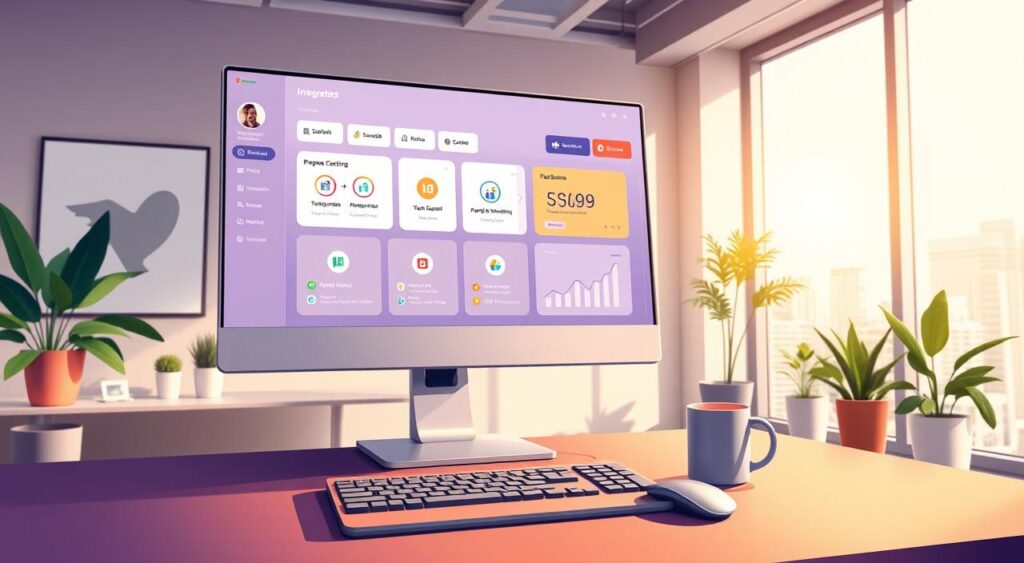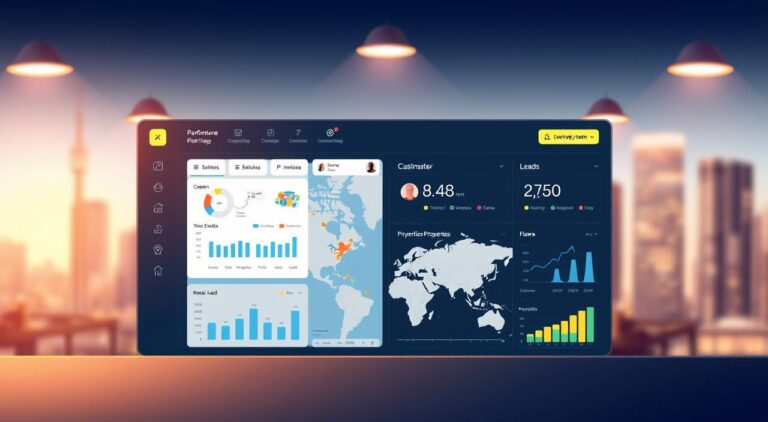Discover AI Tools Helping Property Managers Automate Tasks USA
Artificial intelligence is reshaping daily operations for real estate professionals across the United States. Industry research reveals measurable productivity gains of up to 40%, making this technology essential for staying competitive.
These intelligent systems are revolutionizing everything from tenant screening to maintenance scheduling. They free professionals from repetitive work that consumes valuable time.
According to Entrepreneur Magazine, 75% of brands implementing automation achieve a return on investment within the first year. This demonstrates clear, tangible business value for early adopters.
Further data from Statista shows that 84% of global companies recognize this technology as a competitive differentiator. The real estate sector has been slower to embrace these advancements, creating a significant opportunity.
This guide explores specific solutions, their benefits for operational efficiency, and practical applications. Readers will discover proven systems and actionable insights to transform their business while maintaining the human touch tenants value.
Key Takeaways
- Intelligent technology can boost team productivity by up to 40%.
- Most companies see a return on their investment within 12 months.
- A vast majority of businesses view these systems as a key competitive advantage.
- The real estate sector presents a major opportunity for early adoption.
- Practical applications span leasing, maintenance, accounting, and communications.
- Forward-thinking professionals can achieve sustained growth and industry leadership.
Understanding the Role of AI in Property Management
Modern property management now incorporates technology that learns, adapts, and improves operational processes without constant human oversight. This represents a fundamental shift in how real estate assets are managed.
Defining AI in the Context of Property Management
Artificial intelligence in this field refers to systems that analyze data patterns to make autonomous decisions. These solutions continuously enhance performance for routine property management tasks.
The technology extends beyond basic automation. It includes machine learning for tenant behavior analysis and predictive maintenance forecasting. Natural language processing handles communication, while smart building systems optimize operations.
How AI Elevates Operational Efficiency
These intelligent systems take over time-consuming manual processes. Data entry, report generation, and scheduling become automated. This allows professionals to focus on strategic growth and relationship building.
IBM’s TRIRIGA Assistant demonstrates enterprise-level applications. It collects Wi-Fi data to analyze workspace usage patterns. The system then provides intelligent recommendations for optimal space utilization.
Modern property management software features user-friendly interfaces. Advanced capabilities remain accessible regardless of technical background. This technology transforms traditional challenges into competitive advantages through data-driven insights.
The Impact of AI on Productivity and ROI
Data-driven technologies are transforming operational efficiency for those overseeing residential and commercial assets. The measurable benefits extend beyond simple time savings to substantial financial returns.
Analyzing Industry Statistics and Trends
Recent studies reveal impressive outcomes from technology adoption. Teams experience 40% productivity increases, allowing staff to manage more units effectively.
Operational expenses drop by approximately 15% through optimized processes. The entire industry expects massive growth, projected to reach $190 billion by 2025.
Insights from Trusted Expert Sources
Entrepreneur Magazine confirms that 75% of brands achieve ROI within one year. This rapid payback period makes the investment decision clear for business leaders.
Statista data shows 84% of global companies view these systems as competitive differentiators. North American marketers already leverage similar technologies for data analysis, demonstrating widespread acceptance.
Key Benefits of AI-Powered Solutions
Forward-thinking real estate professionals are discovering powerful benefits from modern technological integrations. These systems deliver measurable advantages that enhance both service quality and financial performance.
Enhancing Tenant Communication and Service
Modern communication tools transform how properties interact with residents. Sixty-nine percent of leads prefer chatbot interactions for immediate responses to availability and pricing questions.
Systems like River save up to 75% of leasing staff time through automated responses. This allows teams to focus on qualified prospects and complex situations.
Twenty-four-seven availability for maintenance status and billing inquiries creates a responsive experience. This professional approach improves tenant satisfaction and retention rates significantly.
Reducing Costs and Streamlining Maintenance
Intelligent systems predict equipment failures before they become major issues. Preventive repairs cost significantly less than emergency service calls.
Nest smart thermostats demonstrate concrete savings, reducing heating bills by 10-12%. The technology learns usage patterns and automatically optimizes temperature settings.
These solutions create a virtuous cycle where cost savings fund further technology investments. Improved efficiency enables portfolio growth while enhanced tenant satisfaction increases occupancy rates.
AI Tools Helping Property Managers Automate Tasks USA
Today’s sophisticated platforms eliminate manual bottlenecks in the leasing and screening pipeline. These solutions deliver immediate operational improvements that transform daily workflows.
Optimizing Leasing, Screening, and Lead Management
Modern chatbots respond to prospect inquiries within seconds, regardless of inquiry timing. They automatically qualify leads based on customizable criteria like income requirements and move-in dates.
Intelligent systems like River collect pre-qualification information and sync with staff calendars. This eliminates double-bookings while actively moving prospects through the leasing funnel. The technology even suggests alternative properties when applicants don’t meet initial criteria.
Revolutionary screening platforms leverage advanced algorithms to search extensive databases. They conduct comprehensive background checks in minutes rather than days. This includes credit history, employment verification, and criminal record searches across multiple countries.
Boosting Efficiency in Daily Operations
These systems handle repetitive tasks that previously consumed valuable hours. They process rent payments automatically and generate financial reports on demand. Maintenance requests get routed to appropriate vendors based on issue type.
The impact is measurable with operational expenses dropping by approximately 15% through task automation. This allows teams to manage larger portfolios with existing staff. Human talent can redirect toward strategic activities like portfolio expansion.
These proven solutions deliver competitive advantages through measurable time savings and cost reductions. They separate industry leaders from those struggling with manual processes.
Exploring Top AI-Powered Property Management Solutions
The landscape of residential and commercial oversight is being transformed by cutting-edge technological solutions that streamline operations. Industry leaders now leverage sophisticated platforms to enhance efficiency across all aspects of real estate oversight.
Innovative Tools for Marketing and Leasing
ResidentSpark stands out as a comprehensive marketing automation platform. It manages social media, creates engaging content, and sends targeted email campaigns to generate qualified leads continuously.
Showdigs revolutionizes the leasing process with self-scheduling capabilities. Prospects can book virtual tours or agent-led visits seamlessly. The platform also provides detailed condition reports for property turnovers.
LetHub captures inquiries from any source and responds instantly. This intelligent system qualifies prospects through automated conversations and books tours automatically. It maintains two-way calendar synchronization to prevent scheduling conflicts.
Advanced Software for Accounting and Customer Support
AppFolio’s Realm-X accelerates financial operations through automatic invoice reading. The system provides intelligent leasing assistance and routes maintenance requests efficiently. It also generates marketing descriptions automatically.
Proper.AI offers expert accounting teams augmented by custom technological tools. The service handles bookkeeping, transactions, and tax compliance with flexible per-unit pricing. No long-term contracts are required.
STAN.AI serves as a 24/7 automated assistant for resident inquiries. It handles questions about maintenance issues, account information, and amenity bookings across all property types. This significantly reduces phone and email volume.
Automation and Integration with Existing Systems
Compatibility with legacy systems stands as a primary concern for professionals seeking to enhance their current operational frameworks. The good news is that modern solutions are specifically engineered to work harmoniously with established platforms.

Leading providers understand that complete system replacement is rarely practical or desirable. Instead, they focus on creating bridges between new capabilities and proven software environments.
Seamless Integration with Legacy Property Management Software
Platforms like STAN.AI demonstrate this approach by integrating directly with industry-standard systems including Vantaca. This allows teams to add advanced functionality without disrupting established workflows or losing valuable historical data.
Accounting-focused solutions such as Proper.AI work compatibly with the software you already use. They support diverse property types from residential to commercial without forcing standardization.
The integration process typically uses APIs for smooth data exchange between systems. Tenant records, lease terms, and maintenance logs flow automatically between platforms. This creates unified operations where automation enhances rather than replaces existing systems.
Reputable vendors provide dedicated onboarding support to ensure smooth transitions. Teams can adopt new capabilities without business disruption or steep learning curves. This preserves your current technology investment while multiplying its value through added intelligence.
The strategic advantage is clear: retain institutional knowledge in established systems while gaining powerful new capabilities. Thousands of organizations have successfully implemented these integrated approaches, proving that technical complexity should not deter advancement.
Data-Driven Decision Making and Predictive Analytics
The competitive edge in residential asset oversight now hinges on transforming operational data into predictive intelligence that anticipates market shifts. This evolution separates industry leaders from competitors through evidence-based decision making.
Leveraging Big Data for Strategic Insights
Advanced analytical systems process rental history, seasonal patterns, and competitor activity to deliver actionable insights. They optimize pricing strategies by monitoring real-time market conditions and booking trends.
These solutions analyze tenant behavior patterns in maintenance requests and amenity usage. This intelligence helps anticipate needs and customize services for improved satisfaction.
Utilizing IoT and AI for Predictive Maintenance
SmartRent demonstrates how IoT sensors combined with analytical algorithms monitor critical building systems. The technology detects anomalies like water leaks or HVAC inefficiencies before they become major issues.
A Washington DC case study with DrizzleX achieved $33,643 in savings over nine months through predictive water monitoring. The system forecasts usage patterns and identifies hidden leaks at the fixture level.
Predictive maintenance transforms reactive operations into proactive strategies. This approach prevents property damage while reducing repair costs by 25-45% across portfolios.
Balancing Automation with the Human Touch
While digital systems streamline operations, the essence of successful property oversight remains deeply human. The most effective approach combines technological efficiency with personalized care.

Preserving Personalized Service in a Digital Age
Some professionals worry that automation might depersonalize their work. However, these systems are designed to enhance human capabilities, not replace them.
The personal touch remains essential for building trust and resolving complex situations. Empathy during tenant hardships and understanding unique property circumstances require human judgment.
Digital tools handle repetitive background tasks like data entry and routine inquiries. This frees your team to focus on meaningful conversations and relationship building.
Today’s residents expect both technological convenience and human accessibility. They want instant answers to simple questions while valuing personal contact for sensitive matters.
The competitive advantage comes from strategically combining both approaches. Use automation for efficiency while preserving human judgment for situations where it creates the most value.
This balance positions your operation as modern yet personal. It builds reputation, drives referrals, and creates sustainable differentiation in competitive markets.
Conclusion
Forward-thinking oversight professionals now stand at a pivotal moment in industry transformation. The solutions explored here deliver measurable advantages—40% productivity gains and 15% cost reductions—proving their immediate business value.
With the intelligent systems sector projected to reach $190 billion by 2025, early adoption creates sustainable competitive edges. Modern leadership requires balancing technological efficiency with the human touch tenants value.
Begin your journey today by identifying repetitive tasks and implementing pilot programs. Transform from daily firefighting to strategic growth focused on portfolio expansion and relationship building.
This evolution elevates the entire profession, positioning forward-looking companies for exceptional results in an increasingly competitive real estate landscape.






